What Is A Furnace vs Boiler?
Your home includes a number of systems that make life more comfortable. There’s air conditioning for cool air and humidity control in the summer months. There’s a water heater so you can enjoy a hot shower or bath. And when it comes to heating your home, you might rely on a furnace, boiler, heat pump, or geothermal system. Looking more specifically at boilers and furnaces, many people use these words interchangeably. While it’s true they both provide heated air for your home, it's important to know that they are quite different in how they do it. For more detailed information about Carrier furnaces and boilers, read on for a boiler vs furnace comparison.
In the most basic terms, a furnace heats air, which is then distributed to your living areas through a series of ductwork and vents. A water or steam boiler systems pipes hot water or steam to radiator units in your living areas to heat your home. Understanding the furnace vs boiler difference can help you make the best decision for heating your home.
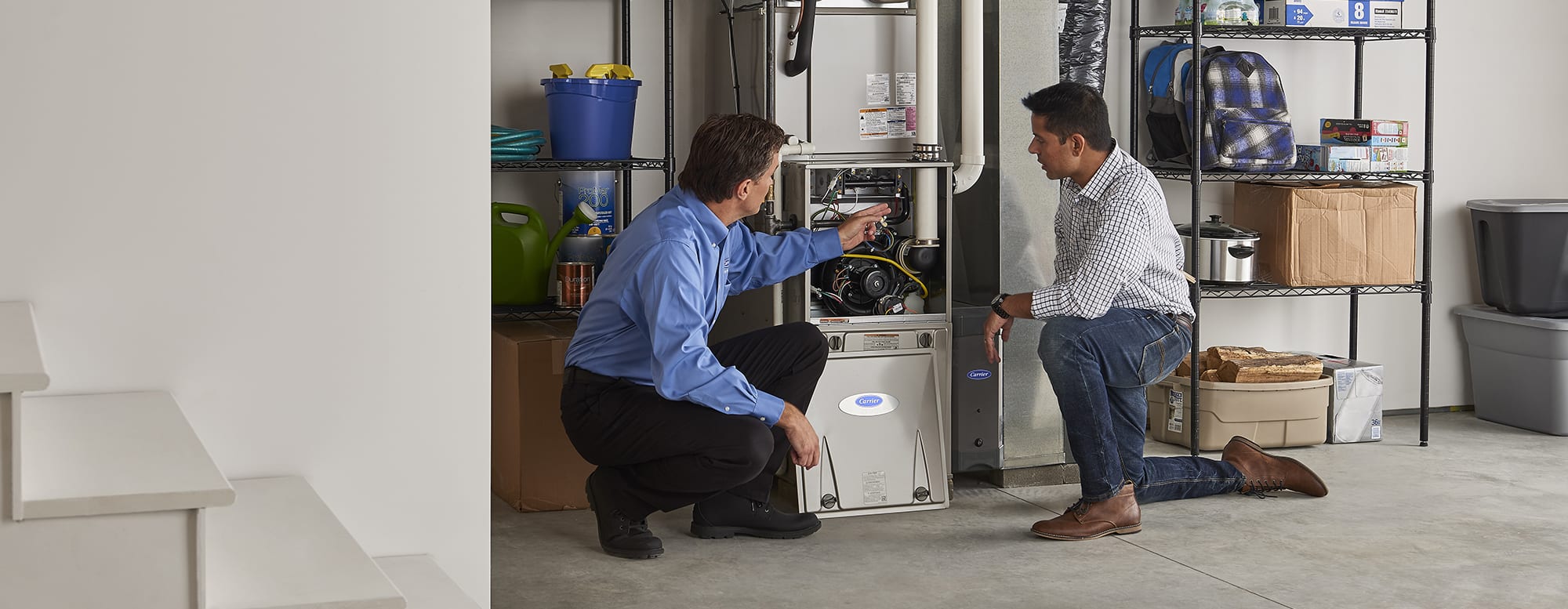
DIFFERENCE BETWEEN A BOILER vs FURNACE: HOW DO THEY WORK?
There is a fundamental difference in how a boiler vs furnace works.
Most modern boiler heating systems use either natural gas or oil as a fuel source. A boiler heats water to create steam or hot water. That steam or hot water travels through pipes into radiators throughout the home, such as radiant flooring systems or baseboard radiators. Rooms in your home are radiantly heated without using fans or ductwork.

Natural gas, propane, oil and electric furnaces heat the air in your home using combustion or electricity to warm up a heat exchanger or heating element, making then forced air furnaces. A strong fan pulls air into the furnace, across the heat exchanger or heating element, and then distributes the warm air into your living areas through the home’s duct system and vents or registers.
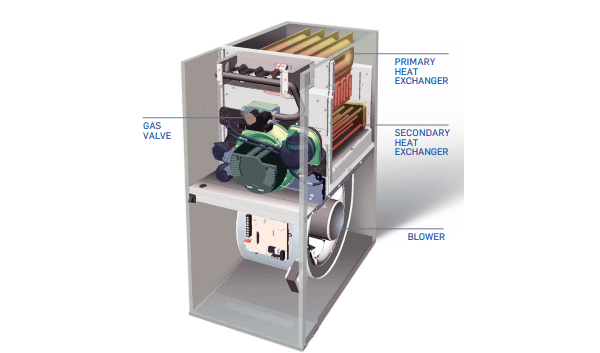
Furnace vs Boiler Maintenance Requirements
For prolonged life expectancy and maximum efficiency, all heating systems should be maintained annually. A professional maintenance visit from your local HVAC dealer might include inspecting vent systems, fuel lines, and heat exchangers for signs of leakage or material degradation in addition to cleaning and lubricating critical components. Find a Carrier dealer to set up a maintenance schedule appropriate for your system.
Because a boiler heating system heats without using forced air, it tends to require less month-to-month maintenance than a furnace that requires routine air filter inspections or replacement every 30 – 90 days. Most homeowners can easily do this themselves. If you want to learn more about how to maintain and service your home furnace, check out our furnace maintenance web page.

BOILER VS FURNACE: MONTHLY COSTS
In many cases, the upfront cost of a new furnace with installation can be lower than it is with boiler heating systems. However, making a generalized boiler vs furnace monthly cost comparison for heating your home is challenging.
Both types of heating systems offer energy efficient models. Looking at Carrier heating products, our gas boilers offer up to 95% AFUE efficiency. Our highest efficiency gas furnace heats your home with up to 98.5% AFUE efficiency, and we have several models rated at 96% AFUE. While published ratings for furnaces and boiler heating systems can be similar, the actual cost to heat your home can be quite different. Fuel costs can vary from region to region, especially when you compare natural gas vs fuel oil. The amount of fuel needed will also vary depending upon the temperature you keep your home, the type of thermostat you use, how well your home is insulated and more.
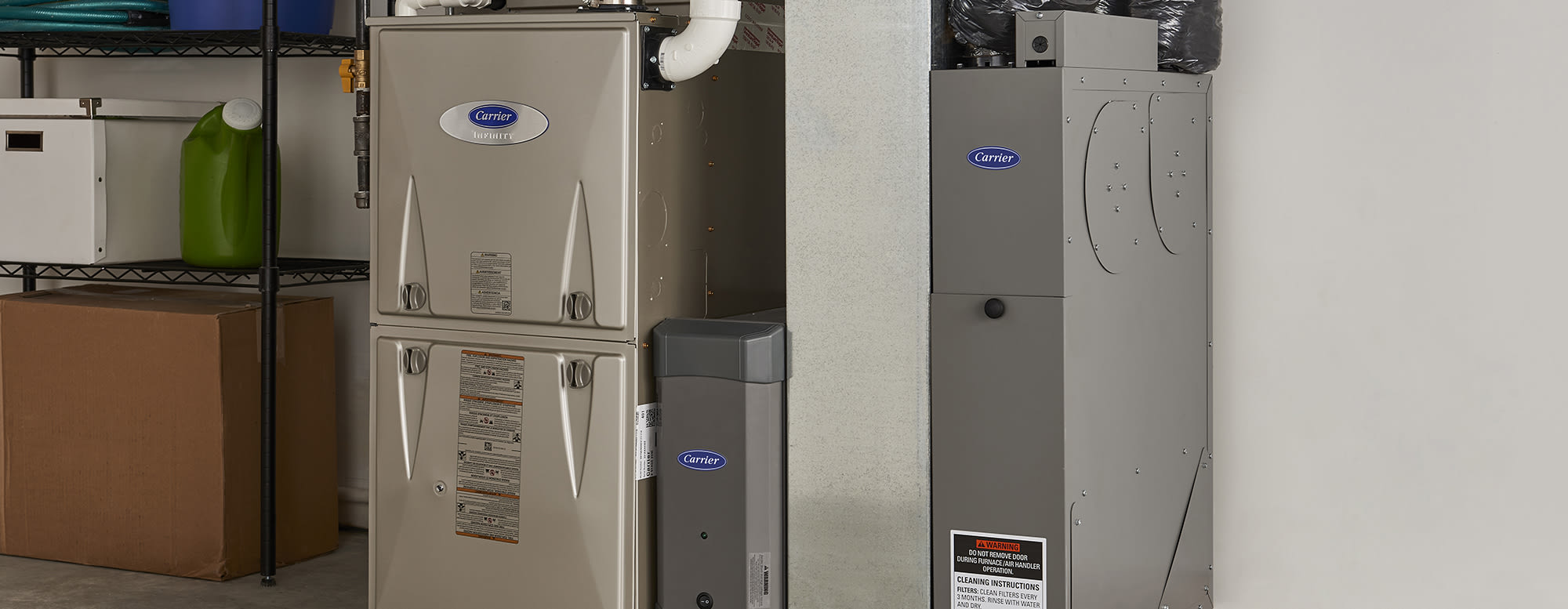
Furnace vs Boiler: The Best Choice for Your Home
If you are replacing an existing system and weighing a furnace vs boiler, the easiest choice is often sticking with what’s already in place. However, this may also be a good time to consider making a change. Making the best choice for your home starts with understanding furnace vs boiler differences and the pros and cons of each. Speak with a Carrier expert near you to find the best option for your home.
Here are some similarities and differences:
Comparing A Boiler vs Furnace
Boiler |
Furnace |
|
|---|---|---|
| Comfort | Radiant heating, requires separate cooling system | Forced air heating, often combined with central air |
| Cost | Usually more upfront cost | Usually less upfront cost |
| Energy Efficiency | Up to 95% AFUE | Up to 98.5% AFUE |
| Fuel Source | Natural gas, fuel oil, propane, electricity, wood pellets | Natural gas, propane, oil, electricity |
| Indoor Air Quality | Doesn’t circulate airborne pollutants | Circulates airborne pollutants through air filter |
| Ductwork | No | Yes |
| Radiators | Anywhere heat is desired | No |
| Water/steam piping | Yes | No |
Boiler Pros and Cons
Boilers offer a number of advantages for heating your home, including draft-free radiant heat, less overall maintenance, and reduced circulation of airborne pollutants in your home because it’s not a forced air system. On the downside, boilers cost a little more upfront (typically), often take more time for installation and setup, and have the potential for repair costs associated with leaking or freezing water pipes.
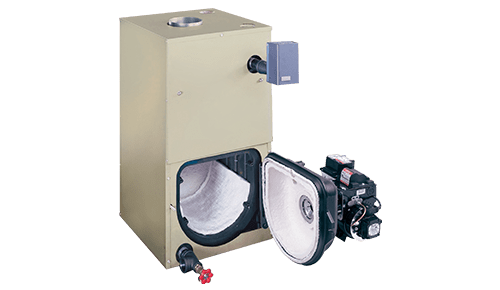
Furnace Pros and Cons
Furnaces are the more commonly used heating systems; typically cost a little less upfront; often take less time to install; and are frequently paired with an air conditioner as part of a complete heating and cooling system.
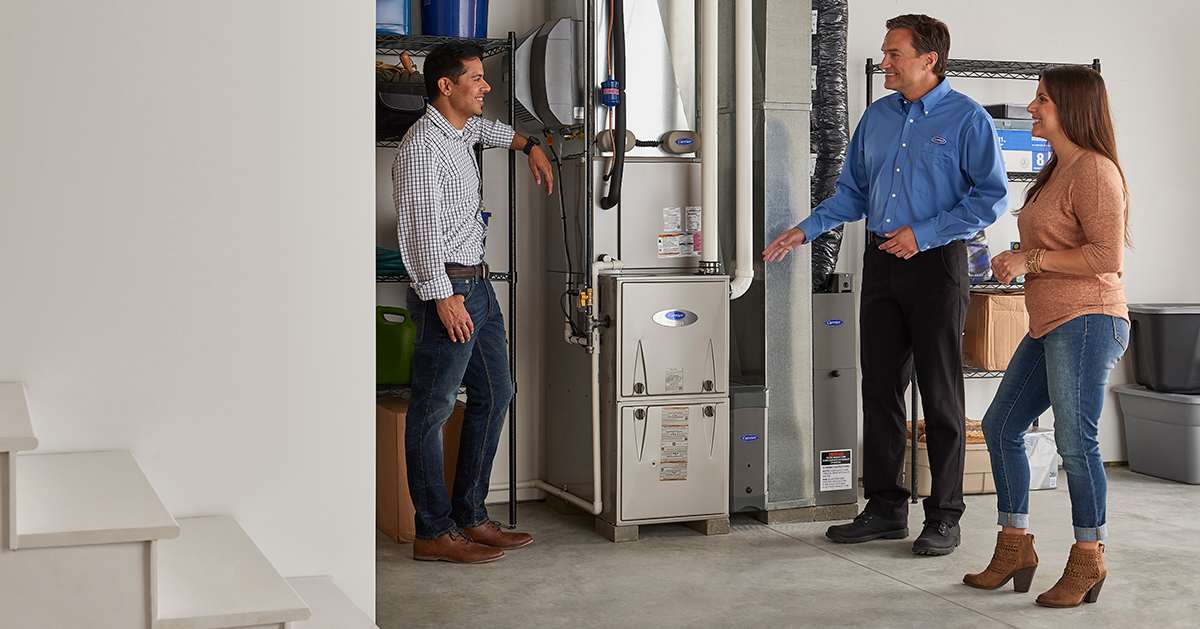
Still Have Questions On A Boiler Heating System vs Furnace?
Still have questions about your home furnace vs boiler heating system? Speak with one of our Carrier professionals today to help in your decision-making process.

Frequently Asked Questions About A Boiler vs Furnace
- Guide to Gas Furnaces
- How Do Gas Furnaces Work?
- Cost Of A Gas Furnace
- Learn about boiler repair
- Discover boiler maintenance tips
- What is the cost Of A boiler replacement vs. new boiler?
- Learn about boiler installation
- Learn about electric furnaces
- Explore propane furnaces

